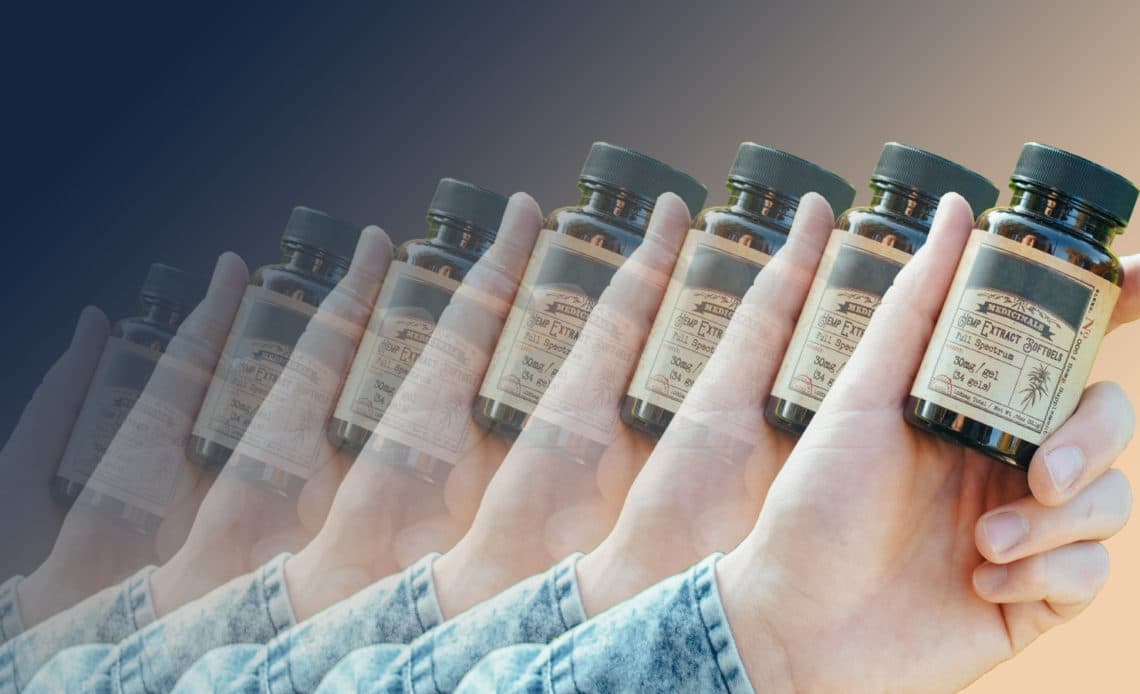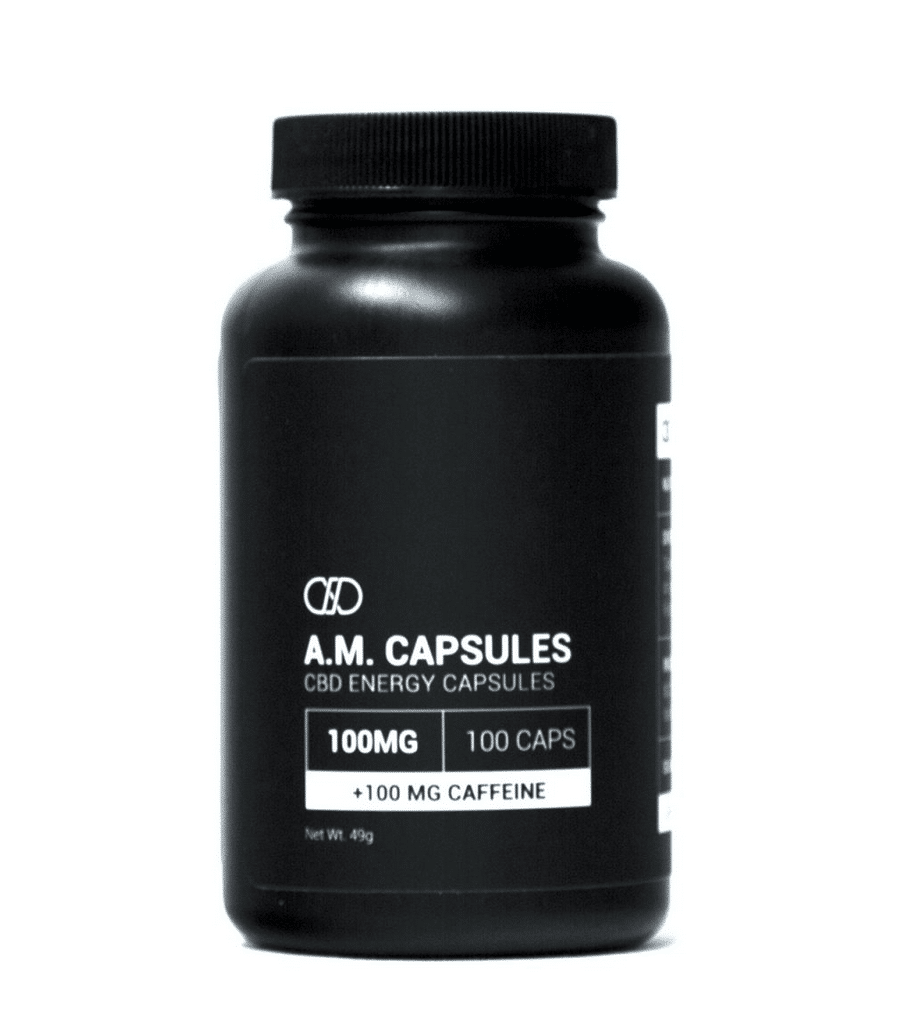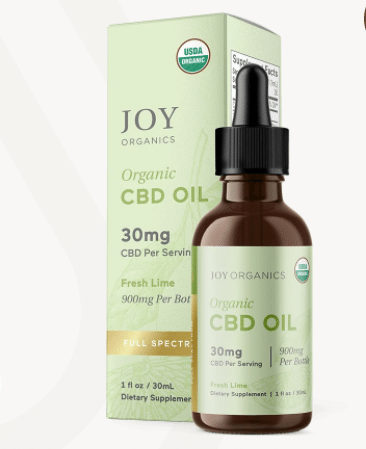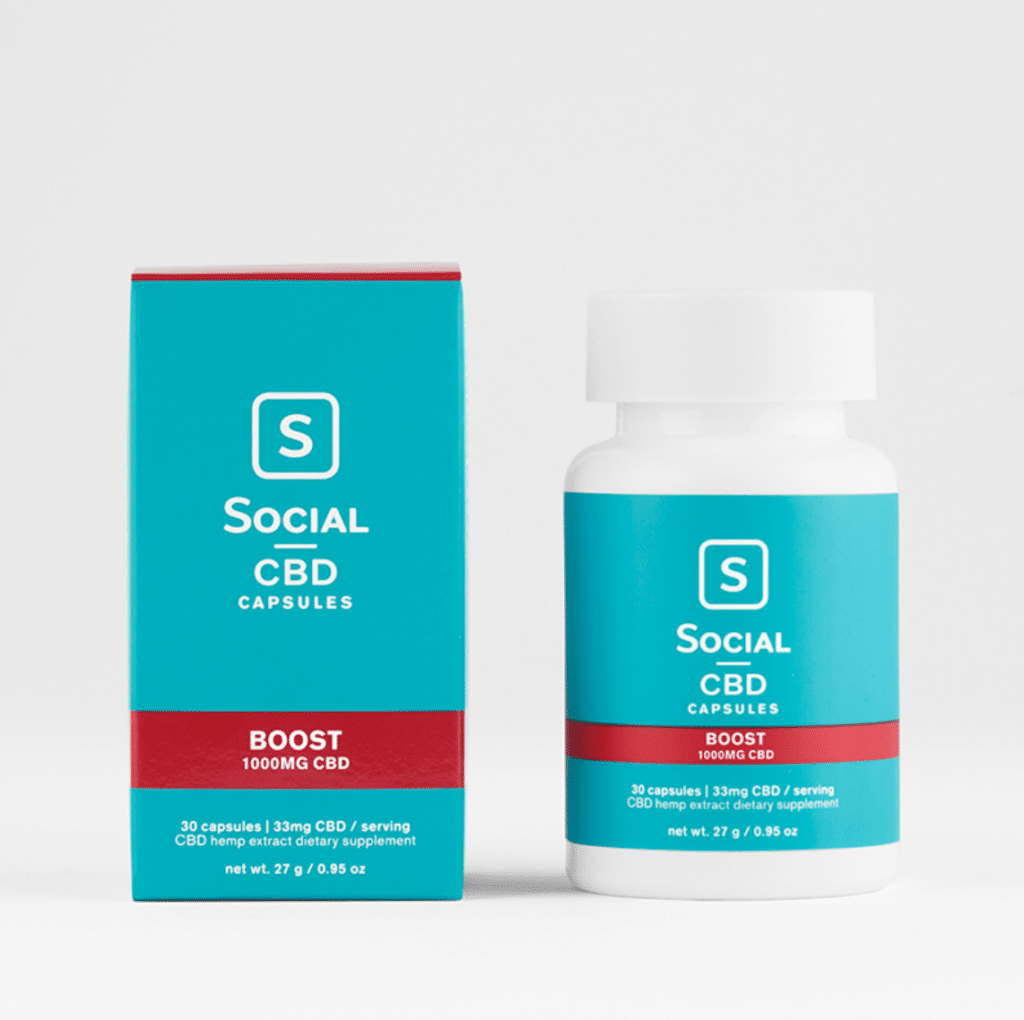
Yes, CBD for energy can be effective. Low-dose CBD combined with low-dose caffeine is actually a great anxiety-free energy booster, particularly if you add adaptogens like Rhodiola Rosea. Long-term use of CBD as a sleep aid can also raise your energy level via improved sleep.
Best CBD Energy Supplements At A Glance

Our top pick
Infinite CBD A.M. Capsules
CBD + 100 mg caffeine per capsule
A simple combination of caffeine and CBD, these capsules are meant for morning usage, just like it says on the label. Each capsule has 100 mg of caffeine and it comes in two CBD dosages: 25 and 100 mg.

Best For Those Who Need Extra Energy
CBD + CBG Morning Capsules
CBD, CBG, 150 mg extended release caffeine, and more!
If you need a greater hit than just 100 mg of caffeine, then this product should do the trick. It combines 30 mg of CBD with 5 mg of CBG, 150 mg of extended-release caffeine, along with other powerful supplements, like L-tyrosine and a terpene blend, to keep you energized throughout the day.

Best Organic Full Spectrum CBD
Joy Organics Full Spectrum CBD
If you already have caffeine on hand and are looking to buy a high-quality, incredibly pure CBD product on its own, then we recommend Joy Organics.
Joy Organics offers both full-spectrum (less than 0.3% THC) and broad-spectrum (0.0% THC) options for its organic CBD, and many of them are flavored. Each tincture provides between 15-30 mg of CBD per serving.

Great for pre-workout use
CBD Focus Shots
CBD, 75 mg caffeine, and L-arginine
Looking for a CBD product to use pre-workout? These CBD Focus Shots combine 20mg of CBD, 150 mg of L-Arginine, and 75 mg of caffeine to boost energy and blood flow.

Super convenient
Social CBD Boost CBD Gel Capsules
33 mg CBD + yerba mate
These capsules contain 33.3 mg of CBD, along with 75 mg each of yerba mate and moringa leaf extract.
When you think of supplements that could raise your energy level, CBD probably doesn’t come to mind. Caffeine, sure. B vitamins, maybe. But CBD?
We’re more likely to look to CBD as a solution for anxiety, stress, sleeplessness, and pain caused by inflammation. And as we should—the results of peer-reviewed studies about the efficacy of CBD for these issues are consistently encouraging. The Unwinder editors absolutely recommend exploring whether CBD can help you manage stress, pain, and insomnia.
But could CBD actually increase your energy level? On its own, maybe—as counterintuitive as that sounds. But there are also some great CBD products out there that add energy-promoting supplements to their CBD. I’ll go in-depth on those products in a bit. In short though, if you want to use CBD as an energy booster, you’ll get the most benefit by combining it with other ingredients that have more directly stimulatory effects, like caffeine or Rhodiola Rosea.
Before we can reach a definitive answer to whether you can use CBD for energy and focus and start looking at specific products, it’s important to get a basic understanding of “the case” for CBD and energy. In other words, we need to know if there’s a substantial neurochemical basis for believing CBD might have any effect on your energy at all.
Then we’re going to take a deep dive into adaptogens, vitamins, nutrients, and other supplements that are proven energy enhancers. Overall, we want to increase your chances of making an impact on your energy maintenance and output, and we think the best way to go about that is to not only add CBD to your regimen but to add CBD that includes energy-enhancing ingredients to your regimen instead.
CBD Is Minimally Psychoactive
You may have heard that CBD is not psychoactive, and doesn’t get you high. Only one of those things is true.
It’s true that CBD doesn’t have the major psychoactive effects of THC—it isn’t addictive or euphoric, and doesn’t cause dizziness, disinhibition, or memory loss. In short, it doesn’t get you high.
However, since the benefits of CBD include anti-anxiety and anti-depressant properties, it is better described as minimally psychoactive rather than non-psychoactive. This distinction is often misstated or elided, even by researchers.
We’ve written about the benefits of CBD in the past—in short, it acts primarily as a systemic anti-inflammatory, as well as a very mild psychological depressant/anxiolytic. Its psychological effects are probably partly secondary to its anti-inflammatory effects, but since it acts on about a dozen different receptors and has over 100 metabolites, the effects of CBD are highly complex.
This is important to understand when discussing CBD for energy. It is not known to be a stimulant—if it raises your energy level, it most likely does so through indirect means.
However, there is a small amount of research to suggest that CBD may, under very specific dosing conditions, act as a mild stimulant in some parts of the brain.
The Case For Using CBD For Energy
Several studies have suggested that cannabinoids may have biphasic effects, or have paradoxical effects at varying dosages. One study on mice found that the synthetic cannabinoid CP-55,940 exhibited anti-anxiety effects at low doses, but promoted anxiety at higher dosages. This study had multiple limitations: the synthetic cannabinoid it used is not sold commercially and mimics THC rather than CBD, the subjects were of course mice, and the study did not directly measure attention, energy or wakefulness.
Other studies have however found biphasic or paradoxical effects of CBD on both humans and rats. Low-dose CBD—around 15 mg in humans—does seem to promote wakefulness, even during times when people would normally be asleep. This comes in spite of CBD’s anxiolytic effects; the mechanism isn’t totally clear, but the researchers hypothesize that it is due to the dopamine-boosting effect of CBD.
To be clear, this does not mean that CBD acts as a stimulant in the same way as caffeine—the effects have always been much milder than that. At most, CBD didn’t make the subjects hyper or wired, but just a bit less tired and more alert.
There are also several other potential routes by which CBD could boost energy levels less directly.
CBD can promote healthy sleep, particularly in insomniacs and people with REM sleep disorder. In this capacity, CBD (at higher doses) is acting decidedly as a depressant and not directly boosting one’s energy levels. However, since sleeping well gives you more energy the next day, CBD may in this capacity promote higher energy levels in the long run.
As an anti-inflammatory, CBD may promote better health overall, and better feelings of subjective well-being, in low to moderate doses, at last for people with chronic inflammation. This anti-inflammatory effect, as mentioned, likely contributes to both its anxiolytic and sleep-promoting effects.
By not only improving objective markers of health but also enhancing your subjective sense of well-being, CBD might be able to make you feel like you have more energy.
Finally, when used in conjunction with stimulants like caffeine, CBD in its role as an anxiolytic may offset the side effects of those stimulants, such as jitters and anxiety.
The side effects of stimulants can sometimes create the opposite of the intended effect—causing you to feel jittery or wired but still groggy, for instance. Under certain circumstances, in the right proportions, CBD could prevent that, allowing you to enjoy the benefits of a stimulant while keeping the side effect profile mild. This is not a case for CBD as a stand-alone stimulant as such, but rather as an adjunct to stimulants, to enhance their effectiveness.
As an anxiolytic, CBD may also increase one’s subjective energy level, despite acting as a depressant, by either preventing you from wasting energy through anxious or nervous behavior, or by preventing the subjective sense of tiredness or de-motivation that often accompanies anxiety.
People who suffer from anxiety would be well-advised to cut out stimulants before adding in depressants. That said, if you have anxiety, treating it will make you feel more energetic, even if the treatment is ostensibly exerting a depressant effect on your brain.
TL;DR: Does CBD Give You Energy?
To recap, here are the four ways that CBD could potentially increase your energy level:
- In low doses, around 15 mg in young adults, it can act as a very mild stimulant that modestly promotes alertness without anxiety or jitters.
- In higher doses before bed (doses vary, but are often in the low hundreds of mg) CBD can help you get to sleep, stay asleep, and sleep more deeply, giving you more energy the next day or over the long term
- If it makes you healthier overall–particularly by reducing systemic inflammation–CBD can improve subjective well-being and increase your self-perceived energy level
- As a mild depressant or anxiolytic, CBD might help ameliorate the side effects of stimulants
- As an anxiolytic, CBD reduces anxiety, which might increase your subjective feeling of how much energy you have despite objectively exerting a depressant effect.
There are a few potential ways that CBD could give you more energy entirely on its own. However, as you can see, if your goal is more energy, you’re better off combining it with other things.
Energy-Boosting Supplements To Combine With CBD
There are quite a few energy-boosting supplement blends that include CBD these days. Before we get into specific products, let’s take a look at some of the other ingredients that they combine with CBD.
Vitamin B-12
You probably recognize vitamin b-12 as a common ingredient in energy drinks and those little five-hour energy shots they sell at gas stations. It plays a variety of roles in the body, mostly related to cellular energy metabolism.
B-12 deficiency is one of the more common vitamin deficiencies, occurring mainly in the elderly and vegetarians. However, more recently medical scientists have begun to recognize that milder, sub-clinical b-12 deficiency can also lead to negative health outcomes, and is quite common in people with poor diets or intestinal issues such as IBS.
Most of the purported benefits of b-12 supplementation relate to correcting this sub-clinical deficiency. Because b-12 deficiency impairs energy metabolism in the brain, correcting it will increase alertness and cognitive ability. There is no clinical evidence that b-12 supplementation is helpful in people who are not deficient, however.
Coenzyme Q10
Usually shortened to CoQ10, this is a molecule that is produced within the body and found in mitochondria. It plays a critical role in mitochondrial energy metabolism, and an important role in the body’s antioxidant system. Because levels of CoQ10 decrease with age, it has gained prominence mainly as a potential anti-aging compound.
A variety of studies do indeed show energy-boosting effects from CoQ10. It mildly reduces fatigue. Other studies have found increased blood flow and reduced cardiovascular stress, but only in patients with impaired cardiovascular function. The effects might not be noticeable subjectively, but they are significant and clinically measurable.
The benefits of CoQ10 are usually mild, but will probably be more significant in older people and heart attack survivors. They only show up over the long-term, after 8+ weeks of daily use. There do not appear to be acute benefits.
Ashwagandha
Ashwaghanda is an adaptogenic and anxiolytic herb, and may in fact be the most effective over-the-counter anti-anxiety supplement. Its acute effects are entirely anxiolytic and energy-lowering. In that role, it is moderately powerful at reducing stress and cortisol levels, and may help you sleep.
Over the long term, ashwaghanda can raise one’s energy level. It mildly enhances sprinting capacity, increases motivation, and speeds up one’s metabolism, apparently via increased thyroid hormone secretion, and perhaps also as a result of improved sleep and recovery.
Ashwaghanda is therefore useful in two ways–acutely, for reducing stress and anxiety and promoting sleep, and long-term, for doing the same but also increasing one’s overall energy level.
Rhodiola Rosea
Another adaptogen, rhodiola rosea has become known as a “calm stimulant.” At doses of 300-500 mg, it has caffeine-like effects, reducing fatigue, and increasing alertness and physical and mental endurance, except that it is non-jittery and in fact slightly reduces stress.
In fact, due to its combination of mildly stimulating and mildly stress-reducing properties, the best use case for rhodiola rosea involves reducing stress-induced fatigue.
At higher doses, rhodiola rosea simply makes people tired and shows no apparent upside.
That said, a calm stimulant is still a stimulant, and rhodiola can impair sleep if taken later in the day. The effects are longer-lasting than caffeine with half-lives ranging from six to ten hours, so it is best taken only before noon.
Caffeine
You know it and love it–caffeine is the world’s most popular energy booster, for good reason. It increases mental alertness and physical endurance, reduces fatigue, and increases subjective well-being. It also is addictive and will prevent you from sleeping well.
Overall, lower doses seem to be better for mental performance and higher doses for physical performance. Due to sleep and addictiveness concerns, caffeine is best used only in lower doses earlier in the day. Its benefits are entirely acute; over the long term, you’re better off consuming relatively little of it, though there doesn’t seem to be any harm in light and occasional caffeine intake.
L-theanine
An amino acid, l-theanine is mildly relaxing and known mainly for being used to reduce the side effects of caffeine. The combination of caffeine with theanine is probably the world’s second most popular nootropic, after caffeine by itself.
Doses of 100-200 mg have been shown to induce relaxation and reduce anxiety. Although not typically used on its own, one study also suggests that theanine alone improves attention, though not in people with very high anxiety levels.
While it has slight value as a sleep aid, theanine is best used in combination with caffeine.
CBD For Energy Reviews
Given what you know now, you can see that energy-boosting supplements have to fall into one of two categories: those which immediately give you a burst of energy, and those which, after weeks of daily use, help you to have more energy every day.
Beware of supplements that claim to do both, or that equivocate over which one they do. It’s technically possible for one supplement blend to do both, but it’s difficult, and most supplements that make that claim are over-promising.

Our top pick
Infinite CBD A.M. Capsules
CBD + 100 mg caffeine per capsule
A simple combination of caffeine and CBD, these capsules are meant for morning usage, just like it says on the label.
Each capsule has 100 mg of caffeine. It comes in two CBD dosages: 25 and 100 mg. As you saw earlier, 25 mg is more in line with what you’d want for an acute energy boost.
The lower-dosed version of Infinite CBD’s AM capsules seems perfect for use in the morning: it’s right in the sweet spot where most people will feel a powerful rush of energy without anxiety or jitters.
The caffeine content is high enough that you do need to be strict about only taking it first thing in the morning to avoid sleep disruption.
The 100 mg CBD dosage might be helpful for people who have anxiety, however, they’d probably be better off consuming less caffeine (perhaps taking rhodiola rosea instead), or adding in l-theanine.

Best For Those Who Need Extra Energy
CBD + CBG Morning Capsules
CBD, CBG, 150 mg extended release caffeine, and more!
Sometimes, a small hit of caffeine with CBD just isn’t enough to get the day started. That’s where CBD + CBG Morning Capsules come in.
If you need a greater hit than just 100 mg of caffeine, then this product should do the trick. It combines 30 mg of CBD with 5 mg of CBG (another cannabinoid that’s been shown to improve energy) and 150 mg of extended-release caffeine to keep you energized throughout the day and is best for those who aren’t highly sensitive to caffeine.
Additionally, it also contains 20 mg of vitamin B3, 500 mg of L-tyrosine, 300 mg of Rhodiola, 200 mg of turmeric, 60 mg of a terpene focus blend, 25 mg of AstraGin (astragalus+ Panax), and last, but not least, 40 mg of hemp extract.
This product is vegan-friendly and contains 100% organic CBD + CBG oil.

Best Organic CBD
Joy Organics Full Spectrum CBD Tinctures
If you already have caffeine on hand and are looking to buy a high-quality, incredibly pure CBD product on its own, then we recommend Joy Organics.
Joy Organics offers premium CBD oil tinctures that are made entirely of USDA Certified Organic ingredients.
Joy Organics has both full-spectrum (less than 0.3% THC) and broad-spectrum (0.0% THC) options and many of them are flavored. Each tincture provides between 15-30 mg of CBD per serving.

Great for pre-workout use
CBD Focus Shots
CBD, 75 mg caffeine, and L-arginine
Looking for a CBD product to use pre-workout? These CBD Focus Shots combine 20mg of CBD, 150 mg of L-Arginine, and 75 mg of caffeine to boost energy and blood flow.
They also contain vitamins C, B3, B6, B12, and D and are available in pomegranate and tropical flavors.
This product is vegan-friendly and contains zero sugar as it’s flavored naturally with apple and lemon juice concentrate along with monk fruit extract.

Super convenient
Social CBD Boost CBD Gel Capsules
33 mg CBD + yerba mate
These capsules contain 33.3 mg of CBD, along with 75 mg each of yerba mate and moringa leaf extract, two lesser-known supplements not typically found in energy boosters.
Yerba mate has been shown to slightly increase fat oxidation while paradoxically slightly reducing heart rate. People report that it gives them non-jittery energy, and these studies are consistent with that. It contains caffeine; how much exactly isn’t clear in this case, but probably in the low tens of milligrams.
Moringa is an obscure supplement. It’s not an energy booster and hasn’t been studied much, but there are indications that it acts as an antioxidant and anti-inflammatory.
The CBD dosage in this product is a little on the higher side for an acute energy boost, but not too high.
Overall this product seems ideal when you want an acute increase in energy, without jitters or hyperactivity. It’s probably mild enough to use even into the early afternoon without impairing your sleep later that night.
Editors note: we are regularly updating this review. If you have your own experience with any of these products, issues with the review, or just want to say hi, please email us at hello@the-unwinder.com.
